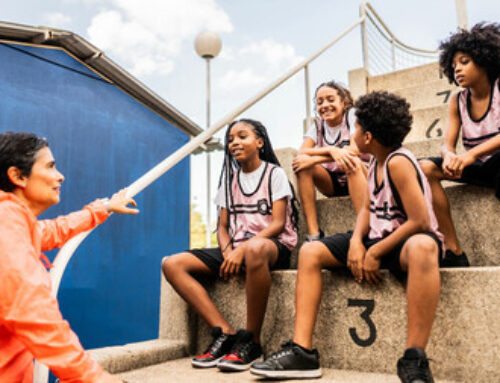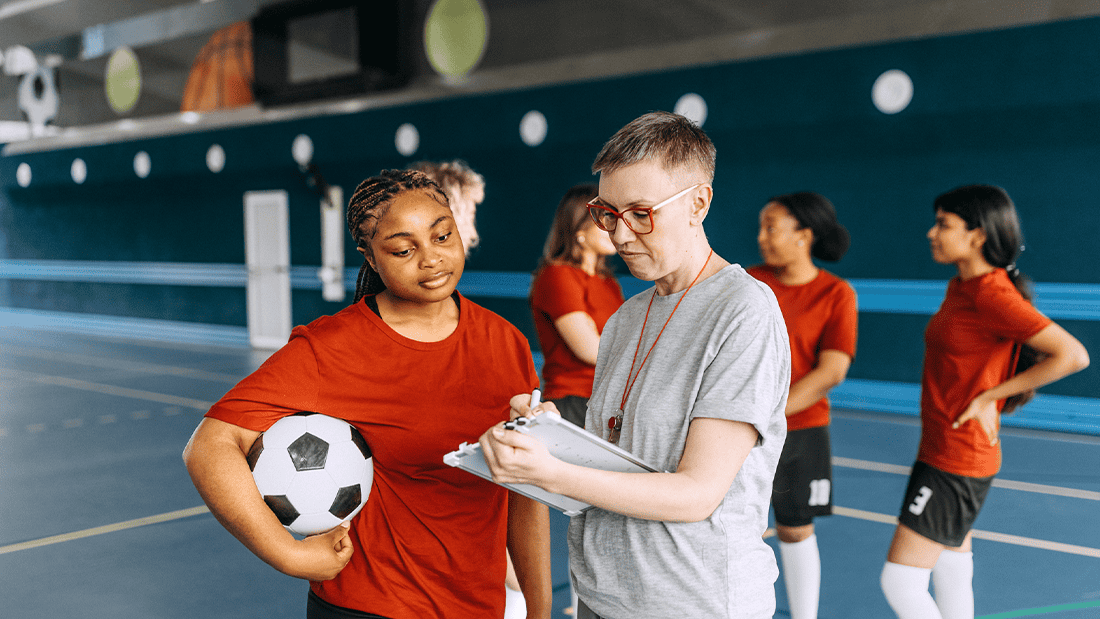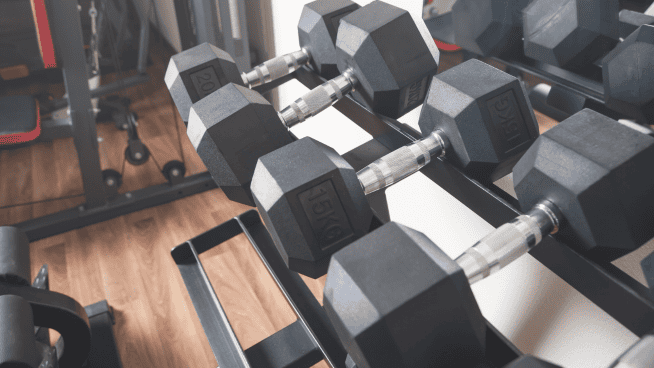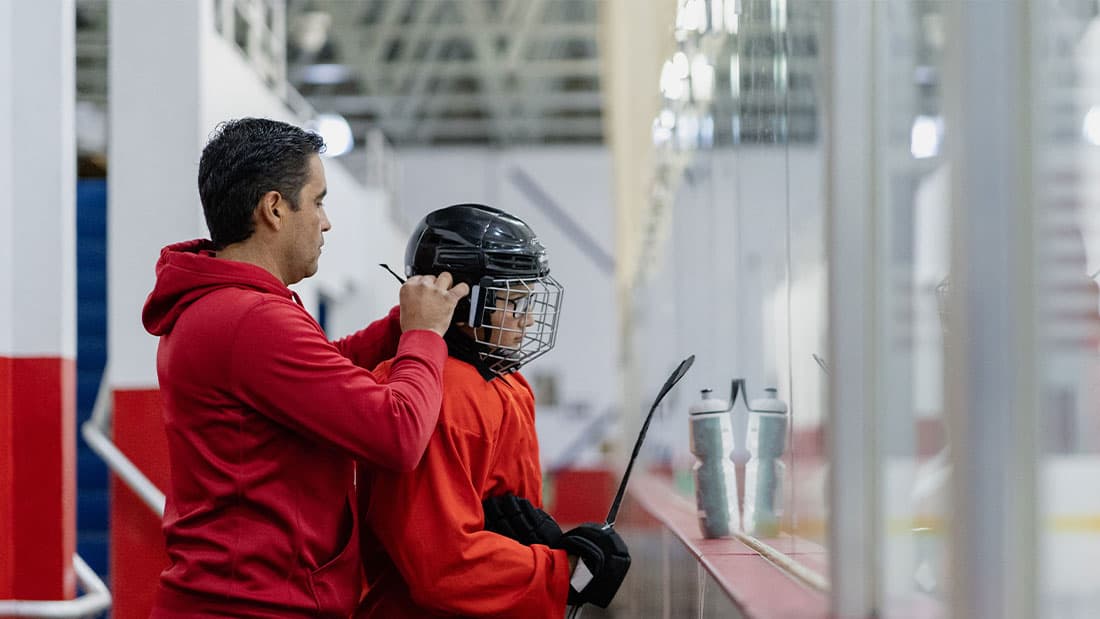3 Reasons Your Kids Need Sports Training
Whether kids need outside sports training is always a hot topic. Many parents are under the impression that their child does not need to lift weights; they do not have the time or do not want to invest the money into anything extra.
The counter-argument is that if you choose the right training facility and workout system, it can be the single greatest investment for your child. The primary concern is that most trainers and coaches want the next big name to brag about or how much they can increase your kid’s bench press. It’s a PR stunt for most gyms.
Most parents and coaches do not seem very compelled to spend potentially thousands of dollars extra per month unless you know that your athlete truly wants to play college or professional sports.
But there are a few underground coaches that understand the true meaning of what sports training can do for your child.
Let’s lay the cards on the table. The answers that follow are not based on guesswork or theory. We have put a team together to help you as parents and coaches understand why this can be the best investment in your child.
I agree that the physical benefits are significant, so I do not want to undermine the benefits kids receive physically from training. But there are so many more benefits outside of the physical ones. With that said, we will touch on two outside hidden benefits and one hidden physical benefit.
Hidden Benefit #1: Mental Health
One of the scariest trends threatening today’s youth’s mental health and future success is the deterioration of meaningful relationships. Another way to say it is, kids are lacking but craving connection. It is having devastating effects on their mental health and future success.
Depression and anxiety continue to increase, and today five to eight times as many high school and college students meet the significant criteria for diagnosing depression and anxiety disorder than 50 years ago.
As I mentioned, kids are craving meaningful relationships, and as the data shows, they turn to social media and other resources to feel connected.
Consider this for a minute: How often do you or someone you know do the following?
If you show up early to meet a friend or colleague either at the office or even a restaurant and wait in the lobby, what are the odds you pull out your phone to kill three or four minutes?
It would be “strange” to say hello to someone you don’t know in today’s world.
Or if someone gets up to use the restroom at a restaurant, can you wait, or do you immediately check your on your phone?
We feel naked without our phones, and if someone is not around us, it feels odd to be by ourselves. So we turn to Facebook, Instagram or Snapchat to scroll through and feel connected.
For example, a recent study shockingly found that the more people use Facebook, the less happy they are likely to feel.
We have heard that kids are depressed because of increased social media use, and I believe there is truth.
But I also believe there is a lot of truth to the idea that kids are struggling with stress, anxiety, and worry more than ever before, so they turn to social media craving an outlet because of depression!
Decades ago, kids could get those meaningful face-to-face relationships from school or their school sports. But it’s nearly impossible today!
It’s not the teachers or coaches fault. It’s because they have more on their plates than ever before.
Teachers are underpaid and overworked. They have larger classrooms and are having to juggle more students than ever before. Guidance counselors are handling, on average, 500 students per school! Time and energy play a huge factor here.
The same goes for school coaches. Teams are getting larger, especially in sports like football. I know the high school I attended between freshman, JV, and Varsity, there were over 300 kids on the football team. Then add to the pressure many coaches get from administrators and even the towns to WIN and WIN NOW! Their families, jobs, and paychecks can depend on how their team performs and ultimately wins or loses.
Coaches love their players and want to be involved in their lives. There are many different factors to consider. Getting dumped in the lunchroom yesterday probably does not crack the top 10 on the priority list for them as the coach.
If you find the right sports training facility, they can provide you and your child with that positive and meaningful relationship and connection!
Kids want someone they can feel safe enough to make themselves vulnerable around. They want someone to guide and advise them on areas outside of sports like school, stress, anxiety, worry, bullying, asking someone out, partying, and a million other topics.
While most kids love their parents, 98% do not feel comfortable enough to have most of those conversations with their parents, and not coaches because they do not want to be judged or lose playing time. They fear other kids finding out about them. Mentorship is the single most excellent investment in your child’s life! Find the right spot, and it’s worth every penny. It could save your child’s life. I have witnessed it!
Hidden Benefit #2: Accelerated Performance
When you find the right athletic training facility with the right system, it will quickly boost your child’s performance! Expert trainers know and understand that each individual has their own needs, and it is figuring out what those imbalances are for your athlete and creating a program that supports them.
With that being said, I wanted to toss in performance because many parents only think it applies to major sports like football, basketball, or baseball. Yet, that is the furthest thing from the truth. I have spent nearly the last decade looking for the highest athletic performers’ patterns, and strength training programs are involved in nearly every single one!
Take a second to consider. Tiger Woods revolutionized golf for many reasons, but one that stands out quickly to the eye is how early on he incorporated strength training into his routine.
People were blown away at how far he was driving the ball, and after a couple of years, it became the norm for golfers to strength train to keep up with Tiger.
Or how about Michael Jordan? If you have seen the series “The Last Dance,” you know that to get over the hump of winning a championship, he needed to ramp up his strength and conditioning program. Jordan even had his trainer, Tim Grover, around him at all times to train! Please take a look at almost every sport in Division I athletics. Most of them have a strength and conditioning program to elevate their performance. Many even have their own designated strength coach for their sport.
Success leaves footprints. Just do what the highest level performers are doing and insert the right training program with your child’s right mentor. Each training facility has its style and philosophy and makes sure it’s the right fit for your child!
Hidden Benefit #3: Improved Academics
Parents and coaches, this one might be your favorite benefit. You read that right. Academics are shown that kids involved in sports training experience higher levels of success in the classroom.
I also believe that this one ties back into number one above in having the right mentor in your child’s life. Someone that can be the outside voice to talk with them.
“How you do anything is how you do everything.”
How they focus and pay attention to details in the classroom directly correlates to how they focus and pay attention to more information within their sports.
No many athletes consider using their academics to get school paid for. Far too many coaches and athletes preach about athletic scholarships, and many sports do not even offer full athletic scholarships.
Academic scholarships have become a lost art and can be a simple way to get school paid for with a little focus, time, and energy.
The National Center for Education Statistics did a study of high school athlete eight years after their senior year and found that compared to non-athletes, they experienced:
- Improved academic achievement
- Higher Test Scores
- Higher Income
- Fewer incidents of mental health problems
I know I tended to have improved grades while in-season training more challenging because I think it gave me some more structure.
Tying It All Together
There is a laundry list of reasons why it’s important both physically and mentally to have your child in an outside sports training program, but I believe you are starting to grasp the idea of why it can change your kid’s lives outside of their sport. We all need that outside voice, and I know as parents and coaches, you have scratched your head a million times as to why they won’t listen to you.
But we were all in their shoes at one point too.
When our parents are not cool and never know what they are talking about! Fortunately for me, early on, I had outside coaches that played a pivotal role in my life. Even a mentor in high school that ate dinner with me regularly. I had more in college, going through the ups and downs of being a Division I athlete.
Do not snub your nose up at what the right sports training or athlete training program can do for your child!
Ask the right questions and decide the best fit for your kids! It could save their lives, and it sure did with mine.
These kids deserve it!
Read More
Kids Play Fewer ‘Pick-Up Games,’ and it’s Hurting Youth Sports
How to Develop a Successful Mindset for a Youth Athlete
What Type of Sports Parent Are You?
RECOMMENDED FOR YOU
MOST POPULAR
3 Reasons Your Kids Need Sports Training
Whether kids need outside sports training is always a hot topic. Many parents are under the impression that their child does not need to lift weights; they do not have the time or do not want to invest the money into anything extra.
The counter-argument is that if you choose the right training facility and workout system, it can be the single greatest investment for your child. The primary concern is that most trainers and coaches want the next big name to brag about or how much they can increase your kid’s bench press. It’s a PR stunt for most gyms.
Most parents and coaches do not seem very compelled to spend potentially thousands of dollars extra per month unless you know that your athlete truly wants to play college or professional sports.
But there are a few underground coaches that understand the true meaning of what sports training can do for your child.
Let’s lay the cards on the table. The answers that follow are not based on guesswork or theory. We have put a team together to help you as parents and coaches understand why this can be the best investment in your child.
I agree that the physical benefits are significant, so I do not want to undermine the benefits kids receive physically from training. But there are so many more benefits outside of the physical ones. With that said, we will touch on two outside hidden benefits and one hidden physical benefit.
Hidden Benefit #1: Mental Health
One of the scariest trends threatening today’s youth’s mental health and future success is the deterioration of meaningful relationships. Another way to say it is, kids are lacking but craving connection. It is having devastating effects on their mental health and future success.
Depression and anxiety continue to increase, and today five to eight times as many high school and college students meet the significant criteria for diagnosing depression and anxiety disorder than 50 years ago.
As I mentioned, kids are craving meaningful relationships, and as the data shows, they turn to social media and other resources to feel connected.
Consider this for a minute: How often do you or someone you know do the following?
If you show up early to meet a friend or colleague either at the office or even a restaurant and wait in the lobby, what are the odds you pull out your phone to kill three or four minutes?
It would be “strange” to say hello to someone you don’t know in today’s world.
Or if someone gets up to use the restroom at a restaurant, can you wait, or do you immediately check your on your phone?
We feel naked without our phones, and if someone is not around us, it feels odd to be by ourselves. So we turn to Facebook, Instagram or Snapchat to scroll through and feel connected.
For example, a recent study shockingly found that the more people use Facebook, the less happy they are likely to feel.
We have heard that kids are depressed because of increased social media use, and I believe there is truth.
But I also believe there is a lot of truth to the idea that kids are struggling with stress, anxiety, and worry more than ever before, so they turn to social media craving an outlet because of depression!
Decades ago, kids could get those meaningful face-to-face relationships from school or their school sports. But it’s nearly impossible today!
It’s not the teachers or coaches fault. It’s because they have more on their plates than ever before.
Teachers are underpaid and overworked. They have larger classrooms and are having to juggle more students than ever before. Guidance counselors are handling, on average, 500 students per school! Time and energy play a huge factor here.
The same goes for school coaches. Teams are getting larger, especially in sports like football. I know the high school I attended between freshman, JV, and Varsity, there were over 300 kids on the football team. Then add to the pressure many coaches get from administrators and even the towns to WIN and WIN NOW! Their families, jobs, and paychecks can depend on how their team performs and ultimately wins or loses.
Coaches love their players and want to be involved in their lives. There are many different factors to consider. Getting dumped in the lunchroom yesterday probably does not crack the top 10 on the priority list for them as the coach.
If you find the right sports training facility, they can provide you and your child with that positive and meaningful relationship and connection!
Kids want someone they can feel safe enough to make themselves vulnerable around. They want someone to guide and advise them on areas outside of sports like school, stress, anxiety, worry, bullying, asking someone out, partying, and a million other topics.
While most kids love their parents, 98% do not feel comfortable enough to have most of those conversations with their parents, and not coaches because they do not want to be judged or lose playing time. They fear other kids finding out about them. Mentorship is the single most excellent investment in your child’s life! Find the right spot, and it’s worth every penny. It could save your child’s life. I have witnessed it!
Hidden Benefit #2: Accelerated Performance
When you find the right athletic training facility with the right system, it will quickly boost your child’s performance! Expert trainers know and understand that each individual has their own needs, and it is figuring out what those imbalances are for your athlete and creating a program that supports them.
With that being said, I wanted to toss in performance because many parents only think it applies to major sports like football, basketball, or baseball. Yet, that is the furthest thing from the truth. I have spent nearly the last decade looking for the highest athletic performers’ patterns, and strength training programs are involved in nearly every single one!
Take a second to consider. Tiger Woods revolutionized golf for many reasons, but one that stands out quickly to the eye is how early on he incorporated strength training into his routine.
People were blown away at how far he was driving the ball, and after a couple of years, it became the norm for golfers to strength train to keep up with Tiger.
Or how about Michael Jordan? If you have seen the series “The Last Dance,” you know that to get over the hump of winning a championship, he needed to ramp up his strength and conditioning program. Jordan even had his trainer, Tim Grover, around him at all times to train! Please take a look at almost every sport in Division I athletics. Most of them have a strength and conditioning program to elevate their performance. Many even have their own designated strength coach for their sport.
Success leaves footprints. Just do what the highest level performers are doing and insert the right training program with your child’s right mentor. Each training facility has its style and philosophy and makes sure it’s the right fit for your child!
Hidden Benefit #3: Improved Academics
Parents and coaches, this one might be your favorite benefit. You read that right. Academics are shown that kids involved in sports training experience higher levels of success in the classroom.
I also believe that this one ties back into number one above in having the right mentor in your child’s life. Someone that can be the outside voice to talk with them.
“How you do anything is how you do everything.”
How they focus and pay attention to details in the classroom directly correlates to how they focus and pay attention to more information within their sports.
No many athletes consider using their academics to get school paid for. Far too many coaches and athletes preach about athletic scholarships, and many sports do not even offer full athletic scholarships.
Academic scholarships have become a lost art and can be a simple way to get school paid for with a little focus, time, and energy.
The National Center for Education Statistics did a study of high school athlete eight years after their senior year and found that compared to non-athletes, they experienced:
- Improved academic achievement
- Higher Test Scores
- Higher Income
- Fewer incidents of mental health problems
I know I tended to have improved grades while in-season training more challenging because I think it gave me some more structure.
Tying It All Together
There is a laundry list of reasons why it’s important both physically and mentally to have your child in an outside sports training program, but I believe you are starting to grasp the idea of why it can change your kid’s lives outside of their sport. We all need that outside voice, and I know as parents and coaches, you have scratched your head a million times as to why they won’t listen to you.
But we were all in their shoes at one point too.
When our parents are not cool and never know what they are talking about! Fortunately for me, early on, I had outside coaches that played a pivotal role in my life. Even a mentor in high school that ate dinner with me regularly. I had more in college, going through the ups and downs of being a Division I athlete.
Do not snub your nose up at what the right sports training or athlete training program can do for your child!
Ask the right questions and decide the best fit for your kids! It could save their lives, and it sure did with mine.
These kids deserve it!
Read More
Kids Play Fewer ‘Pick-Up Games,’ and it’s Hurting Youth Sports
How to Develop a Successful Mindset for a Youth Athlete
What Type of Sports Parent Are You?











